Hello, everyone! Welcome back to the reread of Susanna Clarke’s Jonathan Strange & Mr Norrell, which we’ve reopened to discuss the TV adaptation now that it’s finished airing on BBC America. You can catch up on past posts at the reread index; read Emmet Asher-Perrin’s episode reviews; or check out all of Tor.com’s posts about this book.
After the jump I’m first going to give first a spoiler-free three-paragraph summary of whether I think the show’s worth watching. Then I’ll give the long version, which is (unsurprisingly) quite long, with spoilers for all of JS&MN, The Ladies of Grace Adieu, and the TV show. And pictures, including the best eyeroll gif ever. I look forward to other people’s thoughts now that the whole series has aired in the UK and US. (Sorry, Canada, where it’s still airing; sorry, other countries that are waiting for the DVD release. Comment whenever, truly, I’ll get the notifications!)
First, the spoiler-free version of whether I think it’s worth watching: it depends on what you valued most about the book. Unsurprisingly, as a TV show, it can’t really convey the richness of the worldbuilding, the delicious prose of the omniscient narrator, or the eerie, numious feel of magic as an additional layer to reality. And I’m not sure seven hours was enough to convey the main plot; some of the pacing, explanations, and transitions seemed rushed to me. Visually, it looks good, though dark, and the spells are generally handled well in terms of special effects.
Most of the casting fits my conception of the characters very well; the major exception, unfortunately, is the gentleman with the thistle-down hair, who seems to have been deliberately shorn of his whimsy. The actors all do a great job with what they’re given, and several scenes evoke their book counterparts thrillingly well. But the show makes a number of changes to Stephen Black’s story that I rather disagreed with. (About two thousand words’ worth of disagreement, in fact.)
So you might give the show a try if your favorite thing is the title characters, or Jonathan/Arabella (which is significantly expanded), or enjoying the visuals of the era—or if seeing several really good scenes over the course of the show is enough upside for you (no judgment! Everyone watches with different priorities.). You might want to give this a miss if your favorite thing is the worldbuilding, the prose, or Stephen’s part of the story.
And now the spoilers, after some ritual disclaimers:
I am going to argue that overall, the show treats its white male characters better than the rest of its characters. I am not arguing that the creators had ill intent or that they are morally deficient; I am discussing these things because they affected my enjoyment of the show and because I believe pointing out these things is important to us as viewers and as people who live in society. I am also not arguing that no-one should like the show; what’s closest to any given viewer’s heart will vary. So, any new commenters: let’s talk and disagree and share different perspectives, but with all that mind, please.
The Marginalization of Stephen Black
My main impression of the show is that far too many of its changes were at the expense of Stephen Black, in a way that suggested the show didn’t realize (a) that he did not have to be diminished to make Arabella and Lady Pole more active and (b) that Jonathan Strange and Mr Norrell, despite being in the title, are not the be-all and end-all of the work. Several of the show’s elements tie into this: the gentleman with the thistle-down hair, his magic, and Arabella; Lady Pole; and the final defeat of the gentleman.
The Gentleman and Magical Bargains
First, there’s a seed of a good idea in turning the gentleman with the thistle-down hair’s magic into a series of bargains, but the show executes it inconsistently, and as a result, Arabella is illogically and needlessly positioned as superior to Stephen.
Frankly, I don’t see the dramatic necessity of turning the gentleman’s magic into a series of bargains. The only thing I can think of is that the show felt that there should be an explanation for why the gentleman didn’t kidnap Arabella immediately. However, this is a problem of the show’s own making. If it had preserved the gentleman’s whimsy, then he could have continued to enjoy Arabella’s company in London, not changing course until he perceived Jonathan to be his enemy, as in the book. Instead, he’s a creeping creeper who creeps, rather than someone who could be charming but was always on the edge of tipping into dangerous cruelty. As a result, he and Arabella could not strike up a plausible friendship, and thus the show required some other reason to keep Arabella out of Faerie until the appropriate moment. Which is too bad, because I think this one-note version really missed a key element of what made the gentleman fascinating and distinctive.
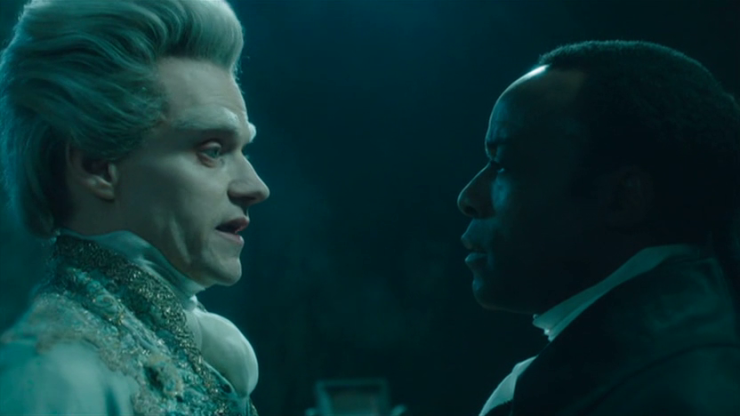
But separate from questions about the gentleman’s personality, I could have gotten behind a bargain-based magic if it were making a statement about social inequality. In the show, Norrell knowingly bargains away Lady Pole; Stephen unknowingly “bargains” himself away (more on that in a moment); and Jonathan unknowingly betrays Arabella. Imagine if instead Sir Walter had told the gentleman, thinking he was a guest needing service, “Oh, of course you can have Stephen for as long as you need.” Or if Jonathan had been tempted with unending magical knowledge by the gentleman and rashly offered “anything I possess” in return. Those might have been nice sharp parallels to Norrell’s initial sin of selling away half of Lady Pole’s life: not knowing, but revealingly careless.
Instead, when Stephen assists the gentleman in episode 2, the gentleman says, “As your reward, Stephen, as my gift, I invite you to join us at our ball tonight. Do you accept?” Stephen responds, “Thank you, sir.” The gentleman then says, “The bargain is done.”
That, of course, is no bargain at all. Accepting a gift does not place one under any obligation to the giver, because that’s what a gift means. Calling it a bargain was therefore vexing, because it suggested Stephen was responsible for his own captivity in the same way that Norrell was responsible for Lady Pole’s.
![[Image: the gentleman and Arabella in episode 3]](https://reactormag.com/wp-content/uploads/2015/07/Gentleman-and-Arabella-episode-3-740x416.png)
But, even supposing we chalk that up to fairies being tricky, which might be reasonable with a bit of in-universe explanation, accepting a gift is not sufficient when it comes to Arabella. In episode 3, she’s crying over Lady Pole and the gentleman makes her an offer:
The gentleman: I could remove what they please to call my Lady’s madness.
Arabella: And how would you do that?
The gentleman: I would need your help, Madam. Your assent. But I should not ask for anything that would not be exquisitely desirable to you.
Arabella: You ask for something in return, sir? If you can do such a thing, if it is within your power to help, then for the love of God, do it. But do not make a bargain of my friend. You will forgive me, sir. We should not meet again without my husband present.
He doesn’t just say, “As my gift to you, I will remove the madness. Do you accept?” And because he is a creeping creeper who creeps, Arabella says no to his request for something “exquisitely desirable,” and good for her. But Stephen isn’t given the same opportunity to spot the trap and reject the gentleman. Arabella gets to be perceptive and forthright, and Stephen doesn’t, and that difference makes no sense within the framework the show has, unnecessarily, created for itself.
Resistance and Complicity
I approve of Lady Pole’s additional attempts to make herself heard in the show. It keeps her present and gives her more to do. But I fervently disapprove of Stephen trying to silence her, encouraging her to accept their fate, and actively helping the gentleman kidnap Arabella—none of which were necessary to make Lady Pole more active.
I appreciate Lady Pole being in less of a magically-induced stupor; I don’t think that was a wrong choice for the book, but it certainly made her less present in it. Her use of fabric art was both visually impressive and a tiny nod to the stories in The Ladies of Grace Adieu. And her attempt to use fairy-tales as a signal to Mr Segundus and Mr Honeyfoot poses minor logistical difficulties but gives us a chance to hear more magical history, so that worked too. (In the book the gentleman set up a translation filter, effectively, on Lady Pole and Stephen, causing them to speak of things they know nothing about. In the show Lady Pole seems to know the meaning of the magical stories she is forced to tell, because she can choose among them for parallel situations.)
![[Image: part of Lady Pole's fabric art from episode 3, showing the two versions of herself and the gentleman looming]](https://reactormag.com/wp-content/uploads/2015/07/Lady-Pole-fabric-art-episode-3-740x416.png)
But in the book, Stephen also resists throughout his enchantment. He tries to tell several people of the enchantment (see chapter 26), repeatedly tries to convince the gentleman to free Lady Pole and Arabella, and manages to prevent or reduce some of the gentleman’s violence.
In the show? The first time Lady Pole and Arabella meet (episode 2), Stephen “implore[s]” Arabella not to say anything about Lady Pole’s conversation. Later it’s implied that he’s trying to keep Arabella safe from the gentleman, but that first time is before the gentleman sees Arabella. Worse, in episode 5 Stephen actually takes Arabella to the gentleman, not in any apparently-reluctant way either but constantly urging her to hurry.
In the same episode, he counsels Lady Pole, “We should accept our position and be thankful for it.” In response, Lady Pole tells him that the gentleman has poisoned his mind—which may be the case but (a) is the first suggestion we’ve had of it (b) is a change from the book, and why? To give Lady Pole someone else to push against? To give Stephen more of a dramatic arc? If the first, Lady Pole doesn’t need it—Norrell is quite enough already, and the show could have restored the sexist doctor who first attended her, if necessary—and if the second, well. Making the only black character morally reprehensible is not a good way to create character growth.
In sum, with regard to Stephen, Lady Pole, and Arabella: my feminism will be intersectional or it will be bullshit. And needlessly dragging Stephen down to make a couple of white women look better (indeed, making him a threat to those women!) is bullshit.
The Defeat of the Gentleman
The show’s treatment of Stephen in the endgame is also bullshit (though not in the service of the female characters, which doesn’t make it any better). The changes are for “drama” and to make Strange and Norrell more central, which is… pretty significantly missing the point.
First, the last episodes make a hash out of Stephen’s experience of racism. Episode 3 shows the death of his mother on the slave ship—though it seems to fall to the gentleman to point out the horror of slavery, which Stephen knows full-well on his own in the book. But unlike in the book, no present-day racism is shown directly. Ariyon Bakare, the actor playing Stephen, makes a valiant effort with the speech in episode 6, but since we’d seen no hint of those experiences previously, the speech is more left-field, and therefore less convincing, than it should be.
Possibly episode 7 was an attempt to compensate by showing racism against Stephen and, as a result, weakening his ties to England as in the book. But it failed because the actions were wildly out-of-character. Jonathan’s letter to Lady Pole accuses Stephen of collaborating with the gentleman—with reason, as we’ve discussed above. But when an agonized Stephen attempts to defend himself—also with reason—he can only speak in fairy tales. In response, Sir Walter calls him a “savage” and Segundus, Honeyfoot, and Childermass drag him away and lock him up. But Mr Segundus knows that Lady Pole can only speak in fairy tales because she is under an enchantment and has seen the same rose at Stephen’s mouth; yet he helps imprison Stephen without ever suggesting that there might be more going on. This makes literally zero sense. Two of my favorite characters are forced to act out of character, Stephen through the whole series and Mr Segundus here, merely to add the “drama” of Stephen’s temporary imprisonment.
(There’s a smaller but also entirely WTF-worthy moment later, when the gentleman releases Stephen, puts a sword in his hand, and tells him that Sir Walter “has made you a slave.” Stephen, fighting the magical compulsion to kill Sir Walter, responds, “He has made me as much a slave as you have.” This is meant to be a rebuke of the gentleman, but the equivalence is so absurd that the force of the rebuke—and any genuine critique of the power imbalance between Stephen and Sir Walter—is lost.)
So episode 7 undercuts its own attempt to establish that because of pervasive racism, Stephen has genuine and valid reasons to be disaffected from England. Then it goes and inserts Strange and Norrell into the confrontation with the gentleman, where they had not been in the book.
This sequence starts when Strange “command[s]” all of English magic to bring “the Black King, the King in the North, the nameless slave” to him “and bind him to kill the Master of Lost-hope.” Let’s ignore that the spell shouldn’t work because Stephen’s only the last of that list, the nameless slave, and not yet any kind of king. More importantly: the spell is a magical compulsion on Stephen to kill the gentleman.
Then there’s a random shooting of Stephen for artificial suspense. (Bye, Lascelles, I sure won’t miss you.) Then the gentleman takes Stephen to Lost-hope. Strange and Norrell follow to, as Norrell says, “instruct” Stephen. (Norrell uses the rain to make a door, which, excuse me Mr Norrell, but the rain shall make a door for the Kings in the prophecy (chapters 13 and 65), not for you, thankyouverymuch.) There Stephen, sporting a pretty terrible dark!Galadriel voice, moves to stop the gentleman when he threatens Norrell (not Lady Pole).
![[Image: the gentleman raising his hand against Mr Norrell, and Stephen stepping toward the gentleman to stop him]](https://reactormag.com/wp-content/uploads/2015/07/Norrell-gentleman-Stephen-episode-7-740x416.png)
Here’s the dialogue:
Stephen: I feel… power. Power.
Norrell: It is the power of English magic, sir! Use it to destroy this beast!
The gentleman: You.
(The gentleman extends his hand to strike at Norrell.)
Stephen: No.
(He takes hold of the gentleman.)
Stephen: It is foretold that I should become king.
The gentleman: Yes. We shall be kings together. You in England, I in Lost-hope.
Stephen: It is destined that I should kill the king and take his place. And now I see that you are that king.
The gentleman: Oh, Stephen…
And then Stephen starts calling on various elements to destroy the gentleman. Our last view of Stephen is him screaming as the gentleman is fully encased in a tree. As Strange and Norrell scramble out of Faerie, Lost-hope collapses behind them.
No Stephen considering, and then rejecting, revenge against the English in favor of protecting someone innocent (Lady Pole). No generosity of spirit as shown by telling the gentleman, “I am sorry. You intended nothing but kindness, I know.” No view of the renewed Lost-hope; no perfect, moving speech from the new King. No Strange and Norrell realizing that they are “ridiculously small” to the Raven King and that they have no idea what happened. All that, sacrificed to Strange and Norrell getting to play heroes in Lost-hope.
The point: missed.
Other Characters: Casting and Changes
What about the other characters? I think they were generally well cast and the actors did a good job with the roles they were given—which sometimes was questionable.
Bertie Carvel as Strange and Eddie Marsan as Norrell were both terrific. That wasn’t how I imagined Strange, but it worked really well, and Marsan was just how I imagined Norrell. Carvel got stuck with some pretty over-the-top stuff in his madness, particularly, and no-one could sell me on Norrell’s single tear before he destroyed Strange’s book, but on the whole I enjoyed their performances immensely (when I wasn’t raging at them invading Stephen’s plotline, that is). I’m perfectly content to hear their voices and see their faces when I dip back into the book from now on.
I was also interested by what the show did with their relationship after Arabella’s apparent death. While having her lie around for seven days was honestly a bit much for me, the question of why Jonathan didn’t try to resurrect her, à la Lady Pole, is quite a good one not explored by the book. (Once it’s brought up I can see how Strange might have run through the reasons why not to, or maybe even attempted it—he tells Sir Walter that “I was a little wild” afterwards, which could cover a multitude of ill-advised schemes.) So that was a change that I thought did add something useful to the book, though again, maybe not quite at that length.
Of the other actors, special shout-outs to Enzo Cilenti as Childermass, who does a truly amazing eye-roll (source):
And to Alice Englert as Lady Pole, whose fierceness was compelling, and to Charlotte Riley as Arabella, who was entirely enjoyable as her usual self and creepy as fuck as the moss-oak.
![[Image: the moss-oak cracked open showing Arabella's face]](https://reactormag.com/wp-content/uploads/2015/07/moss-oak-with-Arabellas-face-episode-4-740x416.png)
I have mixed feelings about the more romantic depiction of Jonathan and Arabella’s relationship in the show, but that’s not down to the actors. (Basically: I like that she is a more rounded character and that he respects her more in the adaptation, but I also liked that though he sincerely grieved for her, they were both able to live full and separate lives at the end of the book while still loving each other. It’s an unusual kind of relationship that was a nice change of pace. But for the adaptation to end on a non-depressing note, it has to create a suggestion that the new writing on Vinculus might be a way to get Strange and Norrell back, which I found confusing at first given the pace of the last episode.)
Finally, I don’t think I’ve seen anything with Edward Petherbridge before, and he was terrific as King George III, as his reputation would have one expect.
Two significant supporting characters, and three minor characters, were not at all as I pictured them, which is no slight to the actors but a reflection on the directions the show chose to go in. (Besides the gentleman with the thistle-down hair, I mean.)
The supporting characters were Drawlight and Vinculus. Drawlight is canonically “rather small,” with short dark hair and “very regular and rather good” features; he’s explicitly a less-clever-looking Byron (chapters 4 and 56). More, “sulky silences and black looks had no effect upon Mr Drawlight whatsoever, since he filled up the silences with his own chatter and was too accustomed to black looks to mind them” (chapter 5), which gives me the impression of someone much less agitated than the show’s version. I see no dramatic purpose for these changes.
Vinculus is also much different in the book. Chapter 13 describes him as having “a certain authority, a certain native dignity.” When he appears in Norrell’s library, “[h]e stood very erect and the expression of his fierce grey eyes was naturally imperious,” and he gives the prophecy “[i]n a strong, clear voice full of passion.” I found the capering and gibbering in the show rather annoying, honestly, and it can’t have helped new viewers figure out what the heck was going on.
The minor characters who were not at all as the book described them were the Raven King, Mrs Bullworth, and Flora Greysteel. In chapter 67, the Raven King wears “expensive” and “fashionable” clothes, though his straight dark hair, which is “longer than any fashionable gentleman would have worn it… gave him something of the look of a Methodist preacher or a Romantic poet.” He also speaks “with a mildly ironic air” and has “an air of great authority.”
Based on looking at portraits of the major Romantic poets, I’m pretty sure “hair nearly to your belt and all over your face” is not what’s contemplated by that description. And, of course, the TV version utters not a word. But beyond that, I think having Vinculus constantly harp on the Raven King’s return must’ve been disappointing to first-time viewers, since he only returns for a few seconds. The book compensates for this by ushering in a radically new era of English society caused by the return of magic, but the series doesn’t really convey the scope and extent of that change: Sir Walter mentions some reports in the opening to episode 7, and that’s it.
(Fun fact: according to the writer of the show (starting at about 11:00 in this podcast, which, yes, also features yours truly), the show creators pitched the BBC six episodes and the BBC told them they could have as many as eight. As we know, they decided on seven instead. Personally I thought the first episode and the last were especially breathless, and only the fourth dragged a bit, but I have seen people say that the first episode was slow, so mileage, it varies.)
As for the other minor characters: Mrs Bullworth, canonically, is “tall, well-formed and beautiful.” She wears a scarlet velvet gown and “an intricate necklace of jet beads” (chapter 36). Here’s how she appears in episode 4:
![[Image: Mrs Bullworth in episode 4]](https://reactormag.com/wp-content/uploads/2015/07/Mrs-Bullworth-episode-4-740x416.png)
Yeah, not only does she not get to condemn Mr Lascelles or the unequal treatment of people who have extramartial affairs, she doesn’t even get to be beautiful or wear glamorous clothes.
Finally, Flora Greysteel, who is characterized in the book “as someone of exceptional abilities and intelligence” (chapter 59) and who falls in love with Jonathan but never does anything foolish as a result, and indeed acts with great integrity even in disappointment—is now a disgraced Byron groupie.
Not appearing: Aunt Greysteel. Mrs Lennox, Mr Segundus’ rich patron who manages her own fortune. Mrs Brandy, who runs the best grocer’s in town by herself (her name is used for an offscreen servant in the Pole household). Jonathan Strange’s students, including Tom Levy, the Jewish former dancing-master. I knew that time constraints would make it difficult for many of these characters to appear (though I really think we could have had Aunt Greysteel), but I missed them very much all the same. (I was also sad that Jeremy died in the Peninsula.)
One change that did please me was the Nottinghamshire brewers, the silent Mr Tantony and his talkative friend. Their appearance at the billards game that prompts Jonathan to walk through a mirror is canonical (chapter 35), but their subsequent appearances are not: they are substituted for another one-off character in the disappearing-books scene, and are added to the final scene at the Old Starre Inn, and that repetition worked well to add humor to the show, also a thing I missed. (On the humor note, the show also made good use of Norrell’s wig, especially in the last episode.)
“Magic shall be written upon the sky by the rain but they shall not be able to read it”
What about the depiction of magic?
As I said way, way up at the top, the feel of magic as an additional layer to reality is a really hard thing to convey on screen. Childermass during Lady Pole’s approach to the house was okay but didn’t really grab me—but I am prone to motion-sickness, so that kind of visual distortion may have worked better for others. I do think the show missed an opportunity to convey that layered-reality feeling with Starecross (which was conflated with the Shadow House for purposes of narrative efficiency): having previously established that Childermass was affected by the magical residue clinging to Lady Pole, carrying that through to Mr Segundus and the double visions of her at Starecross would have worked pretty well, I think.
But the spells from the book generally looked good: the talking statues in York, the rain ships, the sand horses, the dead Neapolitans (three were more than enough!). Even the raven on Childermass’ cards was very nicely done. (Oh, and a tiny, effective change from the book: here, the spell that Mr Segundus buys from Vinculus is one to join things together. I flat-out cackled when he said that in episode 1, because I knew what it meant for the ending.) On the sound design front, the bell sound to signal that Lady Pole and Stephen were being magically silenced was a very nice touch, as was the creaking-wood sound of the encroachment of Faerie/magic; it conveyed a leaning quality that really worked for me.
![[Image: sand horses racing toward the water]](https://reactormag.com/wp-content/uploads/2015/07/sand-horses-episode-2-740x416.png)
Some of the magical additions worked less well for me, effects-wise. I was not a fan of the random wizard-fu between Strange and Norrell in episode 7: big flaming faces, Jonathan, really? What is this, The Wizard of Oz? I also didn’t like the face-stretching effects for Jonathan’s madness and for the life-draining of the Black Tower: I know the CGI budget was limited, but I would much rather have seen people with candles behind the eyes and hollow shells in front (which I’d think could mostly be accomplished with practical effects) than those quite similar and not very visually-interesting effects, or for that matter, Mr Honeyfoot’s ears flapping around (again: really?).
And the life-draining of the Black Tower was another unnecessary change that didn’t make much sense. The idea of a time-limited curse is very understandable, much more so that “killing the magician breaks the spell! Wait, why didn’t it break the spell? Wait, where are we going? Wait, why are we alive?” I honestly don’t know what reason the show has for the spell not being broken at the gentleman’s death, since it removed the references to a hundred years. Vinculus says the bit about Strange and Norrell being the spell of the Raven King while he and Childermass are watching the Black Tower leave, and specifically says “he is spinning it now” as the Tower spins out of view—so I think we’re supposed to understand that the Raven King took them away for… reasons? Seriously: a hundred years would have been so much simpler.
Cinematography and Other Visuals
Finally, a few inexpert words on the general look of the thing, how it was shot, its landscapes, and so forth. This is far from my specialty, so I’d especially love people to chime in here.
I was really struck by the way the show put the camera at the very edges of things or even seemed to be peering through things. For instance, in the first episode, the camera is in what seems to be an empty corner of the room looking at Norrell and Sir Walter talk, until we hear coughing and see Emma’s hand come across the frame:
![[Image: Lady Pole's hand across the foreground, with Norrell and Sir Walter in the background]](https://reactormag.com/wp-content/uploads/2015/07/Lady-Pole-POV-episode-1-740x416.png)
I thought this was a neat way of establishing POV and of signaling Emma’s isolation and invisibility. Shots from the edges of rooms are pretty common throughout the show, though most of them aren’t in scenes where that camera angle can accomplish as many things as this one.
The camera also uses what I will call, because I don’t have the technical vocabulary, almost a peephole effect of darkness around the edge of the frame. One example is much of the final scene in Lost-hope, where the flickering lights of Stephen’s magical confrontation give a kind of jerky, very early-cinema feel to the action and also help focus attention on the different groups of characters:
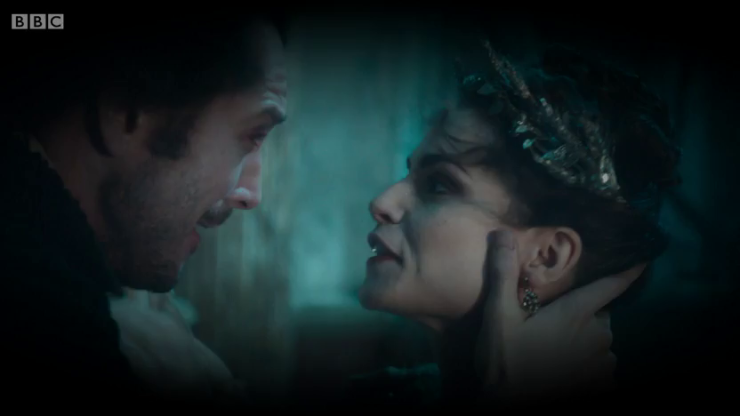
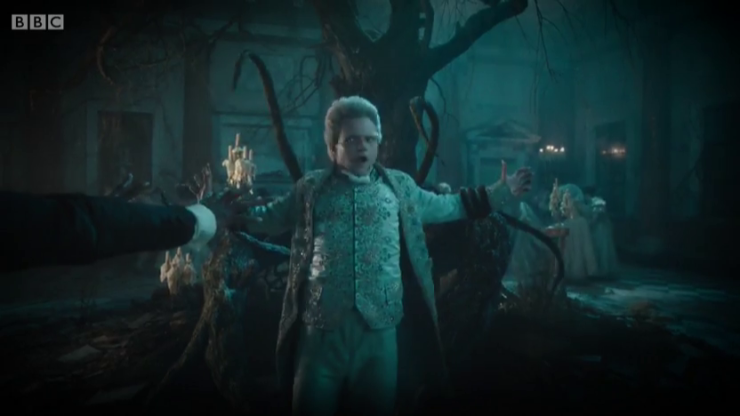
While I didn’t like the content of this scene, I thought this was a neat effect.
As for locations: Lost-hope didn’t look like the book’s descriptions, and the King’s Roads arguably did but still didn’t resemble my mental image. Nevertheless, they both conveyed the necessary overall impression and I was pleased with them. The rest of the settings seemed… appropriate? Sorry, judging the historical accuracy of such things is really out of my area of expertise.
Finally, I was pleased to have the paintings that were prominent in the book also appear in the show, which makes sense given the medium. So we got the Venice paintings in episode 2, the ones that caused me to do art history without a license, and a painting of the Raven King, though not a huge mural and not in company with the King of Southern England (see chapter 32), because the show never really explained the whole Northern England & Southern England thing very well.
Now that I have talked on, and on, and on: what did you all think? What worked for you, what didn’t, what was a pleasant surprise or a disappointment? What did I not talk about—yes, there are some things!—that you’d like to discuss? I’m really curious to hear what you all thought, so please chime in.
Kate Nepveu was born in South Korea and grew up in New England. She now lives in upstate New York where she is practicing law, raising a family, and (in her copious free time) writing at Dreamwidth and her booklog.










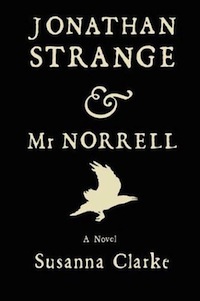
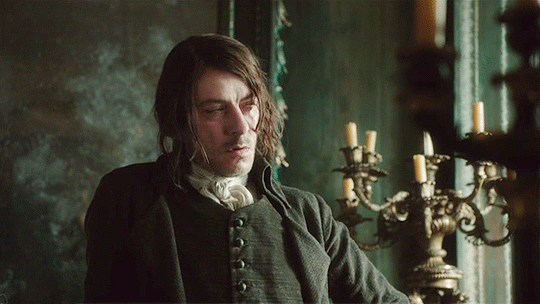
![[Image: The Raven King]](https://reactormag.com/wp-content/uploads/2015/07/John-Uskglass-episode-7-740x416.png)